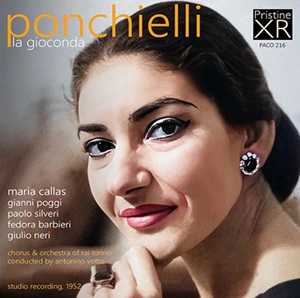
Amilcare Ponchielli (1834-1886)
La Gioconda – opera in four acts (1876)
Gioconda: Maria Callas (soprano); Enzo Grimaldi: Gianni Poggi (tenor); Barnaba: Paolo Silveri (baritone); Laura Adorno: Fedora Barbieri (mezzo-soprano); Alvise: Giulio Neri (bass); La Cieca: Maria Amadini (mezzo-soprano)
Chorus & Orchestra of RAI/Antonio Votto
Score & Italian only libretto available for download online
rec. 1952, RAI Auditorium, Turin
Ambient Stereo XR Remastering
Pristine Audio PACO216 [3 CDs: 166]
Maria Callas’ admirers have had two studio recordings of La Gioconda to choose from over the decades. The one under consideration in this review has been something of a sort of poor cousin to the later stereo version made for EMI seven years after this one. Pristine Audio have released the older set, the latest issue in their Callas series of recordings, which have been updated acoustically by their XR mastering process. Not a company to leave anything to chance, they have also released a version of the 1959 stereo La Gioconda (review). However, on first hearing their improvements to the sound of the 1952 version now gives it a claim to be the Gioconda of choice for Callas aficionados; its merits have certainly become more apparent to this reviewer.
One of the main problems with this recording has always been the boxy, constricted sound which is common to all of the Cetra recordings from that era. Pristine has refurbished the sonics impressively by proving a new more resonant acoustic which give the voices more room to register and also accentuates some of the more atmospheric moments of the opera, for example, the evocative chorus of Dalmatian sailors that opens the Second Act.
Maria Callas was in her finest vocal state in 1952 when these sessions occurred. Her Gioconda is a woman of fire and passion. In 1959 her portrayal of the street singer had become more finely nuanced in terms of vocal details to illuminate the character, but against that one must accept that the first signs that her voice was beginning to decline were starting to appear on the horizon. In the 1952 set her voice does everything she asks of it. Listen to her impassioned plea to Duke Alvise to free her mother; Callas tackles it with artistry and abandon in a searing vignette that lasts not much more than a minute.
The other singers who come off relatively well here are Paolo Silveri’s Barnaba and Giulio Neri’s Alvise. Silveri doesn’t have an innately villainous vocal timbre but he is very effective, he sings his music with power and he offers some interesting moments of vocal shading than several other baritones who have sung Barnaba. (i.e. Robert Merrill, Ettore Bastianini and Leonard Warren). On the end of the spectrum, Duke Alvise requires little vocal nuance as he goes about wielding power and dominates all of his scenes. Giulio Neri’s granite-like bass is just the ticket here. Most other recordings have fared well in their choice of bass for Alvise. Ivo Vinco, Cesare Siepi, Plinio Clabassi, Samuel Ramey, and Nicolai Ghiuselev all give fairly accomplished performances of the role.
Fedora Barbieri was a huge-toned mezzo which did well in roles like Amneris and Azucena. As Laura she isn’t very subtle but then Ponchielli is much at fault here by giving her music which requires power and projection. The character of Laura is really dominated by the men in her life so for dramatic and musical reasons she should really have been given music of tenderness and vulnerability, of the kind would have been more suited to a lyric mezzo of the Frederica von Stade variety. Unfortunately Laura is saddled with often forceful vocal lines which make her into a rather a tough cookie. Barbieri imposing vocal presence only accentuates this effect. Still she is quite exciting in the confrontation duet with Gioconda and also the dramatic duet with Alvise in Act Three. Her voice is well-controlled and sumptuous if a trifle too fierce in manner to gain the sympathy of the listener.
Gianni Poggi offers the main difficulty with this set. His voice is dramatic and well controlled but he is too much the stentorian tenor singing to the rafters. “Cielo e Mar” is often mistaken by tenors as a barn raising solo, for which the composer is partly to blame. In actuality it is a reverie or self-musing set against the night sky. In that it has a similarity with Donizetti’s ‘Una furtiva lagrima”, another aria that has been much misunderstood by tenors over the last century or so. Unfortunately Poggi despite having impressive range and volume, pretty much gives it the semaphore treatment, on occasion becoming a little strident. At least he is consistent because he keeps it up throughout the rest of the role. For more involving singing one needs to turn to Domingo, Pavarotti, and even the under-rated Giorgio Lamberti on a much less admired Sony recording.
Antonio Votto often takes a grand, leisurely approach which works extremely well for Ponchielli’s score. Consequently there is a sweeping momentum that I rather approve of on this recording. It certainly mounts a convincing defense against those who proclaim La Gioconda to be a second rate composition. Votto’s account of the Prelude is one of the most moving on any of the available versions. It must be admitted that he does observe some traditional cuts to the score, the most harmful of which is a huge chunk removed from the Second Act Finale. Overall Pristine’s fine new transfer has reversed the order of preference towards the 1952 recording over the 1959 one (which also has some casting flaws). Most Callas lovers would want a copy of both sets in any case. If one is keen to hear another historic take on Ponchielli’s potboiler, then the 1931 La Scala recording, superbly transferred by Naxos is well worth checking out (review).
Mike Parr
Previous review: Ralph Moore (October 2024)
Availability: Pristine Classical

















